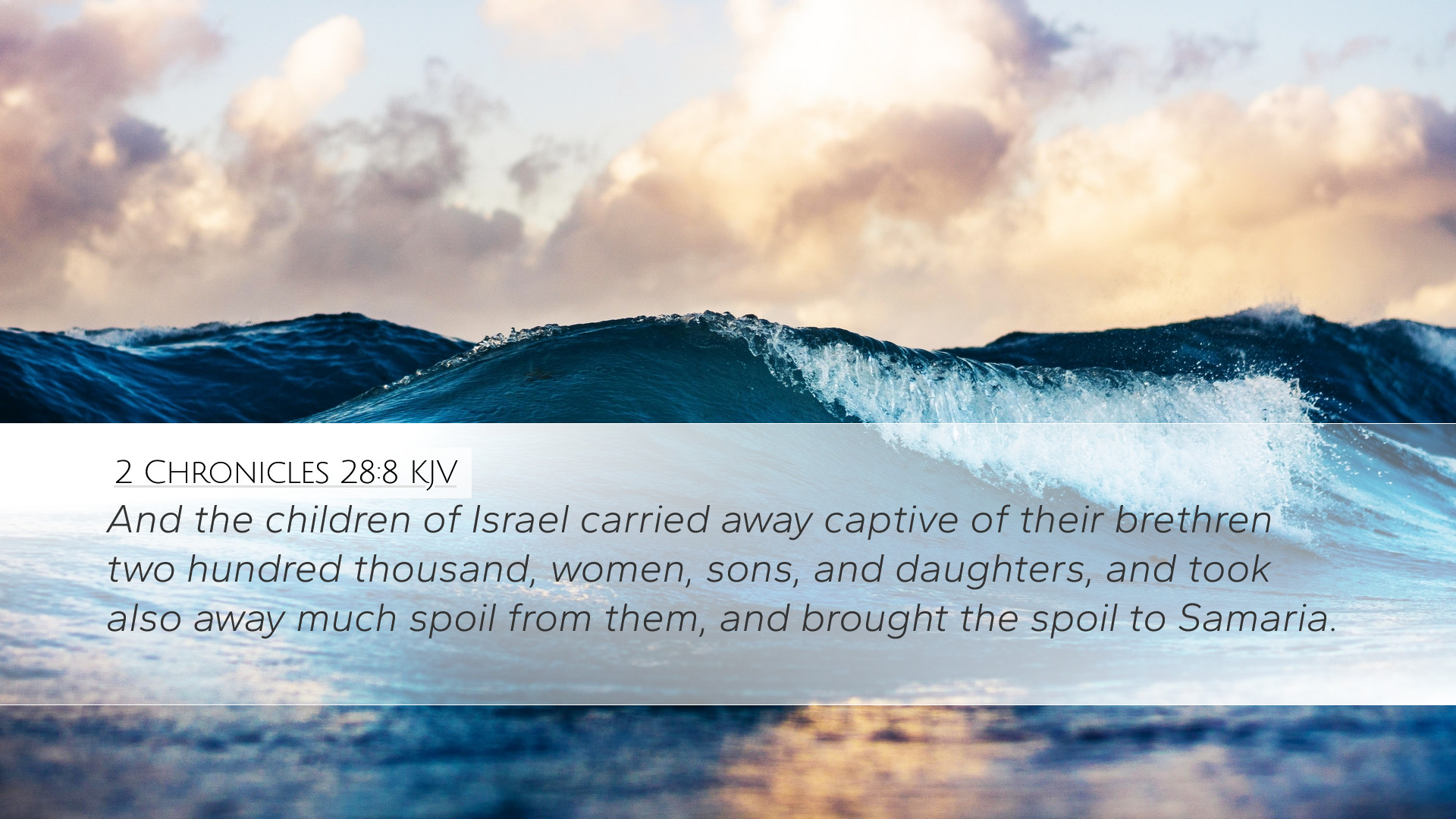Commentary on 2 Chronicles 28:8
Verse Reference: 2 Chronicles 28:8 - "And the children of Israel carried away captive of their brethren two hundred thousand, women, sons, and daughters, and took them away to Samaria: but a prophet of the Lord was there, whose name was Oded."
Contextual Overview
The context of 2 Chronicles 28 is set against a backdrop of turmoil in the kingdom of Judah, under King Ahaz. Ahaz’s reign was marked by idolatry, alliances with foreign nations, and ultimately a military defeat. The verse tells of the consequences of the war and subsequent captivity, highlighting the tragedy of brother against brother within the covenant community.
Key Themes
- The Sin of Brother Against Brother: This incident illustrates the tragic results of internal strife within Israel. The division and hostility that arose led to the capture of their own brethren.
- Divine Intervention: The introduction of the prophet Oded underscores God’s mercy amidst chaos. It indicates that despite Judah's sin, God remained involved in the affairs of His people.
- Consequences of Violating Divine Law: The war and resultant captivity serve as a stark reminder of the perils of abandoning God's commandments and pursuing idolatry.
Insights from Commentaries
Matthew Henry
Henry emphasizes the gravity of the situation by indicating that the actions of the Israelites were not just military but deeply rooted in spiritual failure. He notes that the captives were “brethren,” which amplifies the severity of their actions against one another. His commentary reflects on the providential preservation of the remnant within the chaos, as the prophet Oded stepped in to deliver a crucial message from God. It highlights the theme of restoration and insists on the necessity of repentance and turning back to God.
Albert Barnes
Barnes offers a commentary that looks at the broader implications of this verse, particularly in understanding the socio-political dynamics of the northern and southern kingdoms of Israel. He explains the captivity as a direct consequence of sinful actions and neglect of God's covenant. Barnes stresses the importance of the prophet Oded's role, framing it as a divine setup for Israel's redemption by challenging the captors to reconsider their actions toward their brethren.
Adam Clarke
Clarke provides a more textual analysis, focusing on the phrases used and the historicity involved. He points out that Oded's prophetic message was one of warning and call for justice. Clarke reflects on the mercy of God, revealing how the voice of the prophet acted as a wake-up call to the captors, urging them to acknowledge the guilt of their actions, thus paving the way for reconciliation. Clarke also draws attention to the varied interpretations regarding the figures presented (200,000 captives) and how it signifies the magnitude of the tragedy.
Theological Reflections
In examining 2 Chronicles 28:8, pastors and theologians might reflect on several key theological implications:
- The Nature of God’s Justice: God’s justice is often imperative in Scripture, and this scenario exemplifies that the consequences of actions are profound and far-reaching.
- Restorative Justice: The intercession by the prophet Oded can be seen as a model for restorative justice, where calls for repentance and return to righteousness play a pivotal role in the narrative.
- Divine Sovereignty: Despite the tragic circumstances, God’s sovereignty remains evident, as He raises prophets to intervene and guide His people back to Him.
Conclusion
2 Chronicles 28:8 serves as a poignant reminder of the consequences of strife within the community of believers and the ever-present opportunity for God’s intervention. It encourages an introspective look into how communities today might relate to this historic event, emphasizing the importance of unity, repentance, and the pursuit of God's will. For pastors, students, theologians, and scholars, this verse encapsulates vital lessons about faithfulness, accountability, and the part that prophecy and divine warning play in guiding God’s people toward restoration.


